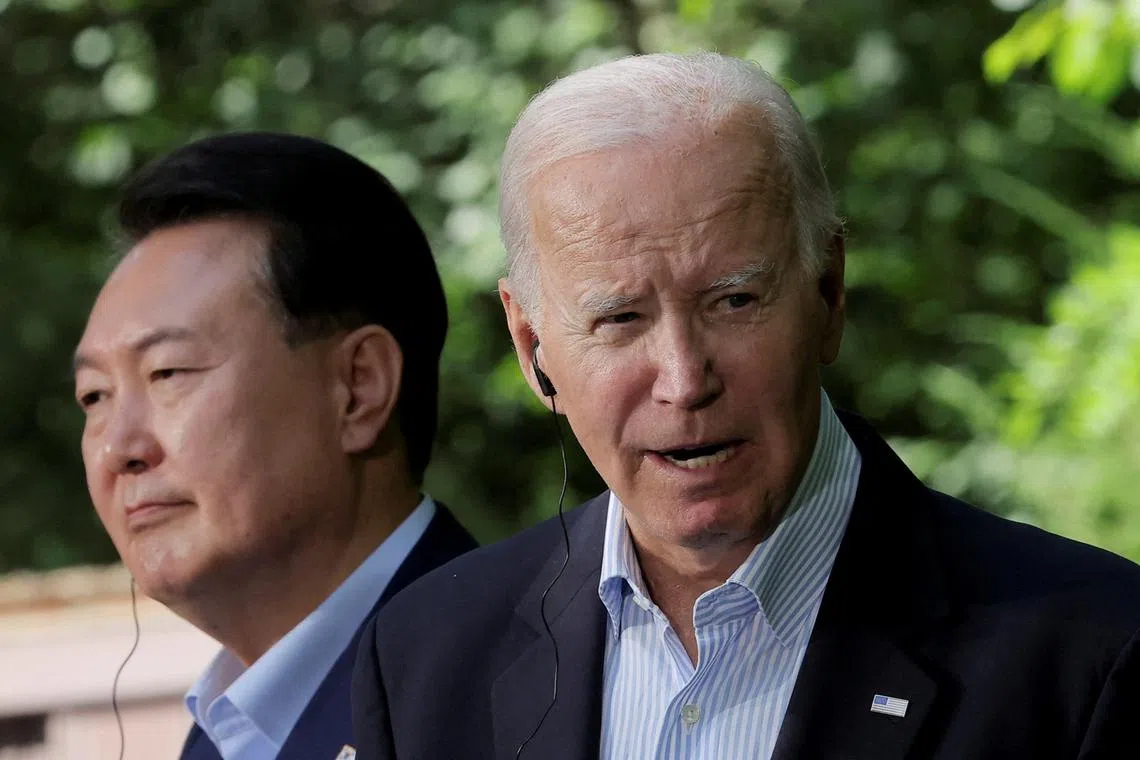US designated South Korea a ‘sensitive’ country amid talk of nuclear weapons
Sign up now: Get insights on Asia's fast-moving developments

The administration of then-President Joe Biden put South Korea on the lowest tier of the Sensitive and Other Designated Countries List in January.
PHOTO: REUTERS
Follow topic:
WASHINGTON/SEOUL – The US Department of Energy (DOE) has designated ally South Korea as a “sensitive” country, a spokesperson said on March 14, after the South Korean president’s brief imposition of martial law and amid talk of Seoul potentially developing nuclear weapons.
The administration of then-President Joe Biden put South Korea on the lowest tier of the Sensitive and Other Designated Countries List in January shortly before Mr Biden left office, the DOE said in a written response to Reuters queries.
The department did not explain why the Asian nation was added to the list, and did not indicate that President Donald Trump was inclined to reverse the measure. The spokesperson said Seoul faces no new restrictions on bilateral cooperation in science and technology.
The designation will go into effect on April 15, media reports said.
South Korea’s foreign ministry said the government was taking the matter seriously and was in close communication with Washington.
“We will actively negotiate to ensure that there is no negative impact on energy, science and technology cooperation between South Korea and the United States,” the ministry said in a statement.
The DOE list of sensitive countries includes China, Taiwan, Israel, Russia, Iran and North Korea, with Tehran and Pyongyang designated as terrorist, according to a 2017 document posted on the department’s website.
President Yoon Suk Yeol and then-Defence Minister Kim Yong-hyun are among the South Korean officials who raised the prospect that South Korea would be forced to pursue nuclear weapons amid fears over North Korea’s accelerated nuclear weapon and ballistic missile programmes, and concerns about the strength of the alliance with the US, which provides a nuclear shield for South Korea.
Mr Yoon and Mr Kim have been indicted on charges of insurrection over Mr Yoon’s six-hour declaration of martial law
Mr Yoon backed off rhetoric about a nuclear weapons programme after negotiating with Mr Biden a 2023 agreement, under which Washington is to give Seoul more insight into US planning to deter and respond to a nuclear incident in the region.
In return, Seoul renewed a pledge not to pursue a nuclear bomb of its own and said it would abide by the Nuclear Non-proliferation Treaty, which it has signed.
That, however, has not been enough to ease doubts over US defence commitments that have fuelled calls for a South Korean nuclear arsenal.
Foreign Minister Cho Tae-yul said in February that nuclear weapons were not “off the table”, though it was premature to talk about such a plan.
“Given that international situations are developing in unpredictable directions, this is a principled response that we must prepare for all possible scenarios,” Mr Cho told a parliamentary hearing.
Mr Daryl Kimball, executive director of the non-profit Arms Control Association, said that in light of such “provocative” statements, South Korea is a proliferation risk and the DOE was prudent to put the country on its list.
“Listing the ROK as a proliferation-sensitive country should rule out any chance of a South Korean request for US approval to enrich uranium and reprocessing spent fuel... to produce nuclear weapons,” Mr Kimball said, citing the country’s formal name, the Republic of Korea.
The handling of the designation raised concerns in Seoul. Mr Cho told parliament on March 11 that his ministry had had no formal communication from the Biden administration and only heard about the possible designation from an informal tip-off.
Countries may appear on the Energy Department’s list for reasons of national security, nuclear nonproliferation or support for terrorism, though inclusion does not necessarily indicate an adversarial relationship with the United States.
“Currently there are no new restrictions on bilateral science and technology cooperation with the ROK,” the DOE said. “The Energy Department looks forward to collaborating with the ROK to advance our mutual interests.”
Though the designation does not prohibit scientific or technical cooperation, visits to the listed countries and cooperation undergo an internal review beforehand, the department said. REUTERS

